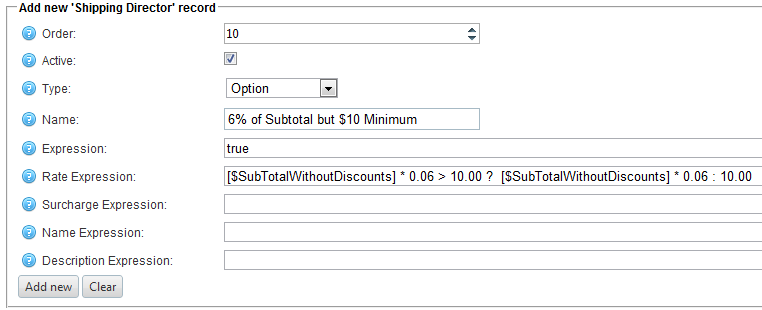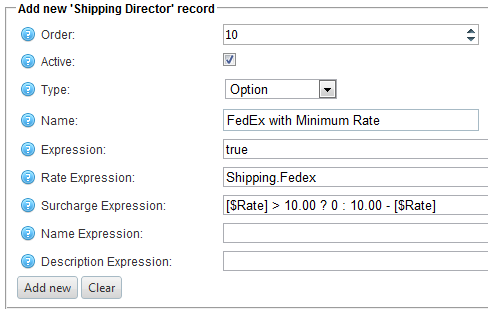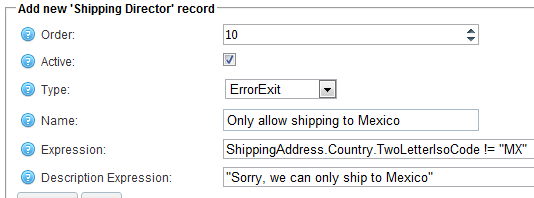Here's a list of all built-in variables. Note that they all start with a "$". As with user defined variables, the must be enclosed in brackets when used - e.g. [$TotalWeight].
Shopping Cart Properties - Set by system at start of rate calculation
$TotalWeight Decimal uses ShippingService.GetShoppingCartTotalWeight()
$SubTotalWithoutDiscounts Decimal (uses orderTotalCalcService.GetShoppingCartSubTotal() )
$SubTotalWithDiscounts Decimal
$SubTotalWithoutDiscountsInclTax Decimal
$SubTotalWithDiscountsInclTax Decimal
$ProductTotalWithoutDiscounts
Decimal (uses PriceCalculationService.GetSubTotal() )
$ProductTotalWithDiscounts
Decimal$IsFreeShipping Decimal uses OrderTotalCalcService.IsFreeShipping()
Shipping Director Record - Set by system for each row (used in debugging and error messages)
$Id Integer SD record's Id field
$Order Integer SD record's Order Field
$Name String SD records's Name field
$Expression String Set before each expression evaluated (Expression, RateExpression, SurchargeExpression, etc.)
Option Processing - Set by system when the record type is Option, OptionExit, OptionReplace (OptionReplace available only in SD ver 1.05 and above)
$Name String
$Description String
$Rate Decimal (e.g. surcharge expression can use $Rate)
The Option record's Expressions can reference $Name & $Description & $Rate variables. Thus, you can adjust the data returned by external shipping rate methods. (Reminder – an external shipping rate method is called in the Option’s Rate Expression – e.g. Shipping.Fedex).
External shipping rate methods can return multiple options/rates. If the $Name of an external shipping rate option is set to "", then that option is removed.
Example: To show an option name of just "Ground" and "Priority" rather than "FedEx Ground" and "FedEx Priority", use [$Name].Replace("FedEx ", "") in the NameExpression to remove the word "FedEx " from the option name.
Shipping Option Request properties (These are passed to other shipping rate calculation methods to override the other methods' configuration page. Not supported by all shipping rate methods.)
$ZipPostalCodeFrom String
$StateProvinceFrom String
$CountryFromTwoLetterIsoCode String
Set by system after other shipping rate calculation method is called
$ShippingOptionsCount Integer
SD sets this after using an external shipping plugin (or SQL) with the total # of shipping rate options it returned. It's not typically used, but if you are doing something where you think no options will match, then you should check it and say something like "call for rate".
Packaging
$Sender string "" Set by system when a package is rated manually (not external shipper rate). Can then be used in Option's Rate, Surchage, Name, Description expressions
$PackageCount Integer 0 Set by system after packaging. Although defaults to 0, if no Packaging is done, the system actually creates 1 package with all shopping cart items just before rate calculation.
Packaging using PackingFirstFitSingleBox
$PackageBoxWeight Decimal
$PackageBoxMaxWeight Decimal
$PackageBoxHeight Decimal
$PackageBoxLength Decimal
$PackageBoxWidth Decimal
$PackageItemAddWeight Decimal
$PackageItemAddDimension Decimal
$PackageShrinkPercent Integer 0 - Used by PackingFirstFitSingleBox - If $PackageShrinkPercent > 0, and the volume actually packed is less than this % of the given box volume, then this will shrink the final box to its actual packed content volume, rather than the given box volume. ("less than this %" => The idea is if the box is "almost full", then use the box dimensions)
Packaging's SenderExpression can evaluate to a string that can contain Ship From Location information. The string is of the form:
"State=...; ZipCode=...; Country=...;"
This allows different Ship From address for each Sender (see Shipping Option Request properties above):
$PackageBox variable (shorthand for setting many package attributes in one line)
e.g. $PackageBox "MaxWeight:40,Height:15,Width:15,Length:15"
Here's how each shorthand attribute corresponds to the built in variable:
MaxWeight => $PackageBoxMaxWeight Height => $PackageBoxHeight Width => $PackageBoxWidth Length => $PackageBoxLength Weight => $PackageBoxWeight AddWeight => $PackageItemAddWeight AddDimension => $PackageItemAddDimension ShrinkPercent=> $PackageShrinkPercent
Rate Request Type - When Packaging, can be set by user to indicate the way that rate requests are made to other rate calculation methods when Packaging
$ShippingRateRequest String
"OneRequestForAllPackages"
"OneRequestPerPackage"
"OneRequestPerSender"
E.g. "OneRequestPerPackage" => Get FedEx rates separately for each package
if $ShippingRateRequest is not set by user, then the system will default depending on if the Packing SenderExpression used:
if no SenderExpression then "OneRequestForAllPackages" else "OneRequestPerSender"
Debugging
$Debug boolean false When true, detailed messages are written to the system log.
(Note: Because log messages are not HTML formatted, they can be hard to read in the browser. So, when viewing a System Log record, click View to see the log detail page. Then, right click the page and "View Source". Scroll down (a bit more than half way) until you see the plain text messages.)
Flow Control (SD ver 1.05 and up)
$Goto Integer 0 Set to a Order/Line number. Can be conditional and dynamic. Set to 0 to skip. E.g. Use ternary if/then/else operator $Goto condition ? 100 : 0 ==> "If condition then Goto 100 (else goto next line)"
Special Functions
Special functions must be assigned to a String variable and must be the first word in the variable’s Expression field. The expression cannot be complex: E.g. it can be like GetLocaleString("...") or GetLocaleString([someotherstringvar]), but cannot include any operators.
GetLocaleString(<string>) get a language specific message.
GetSetting(<string>) get a setting


